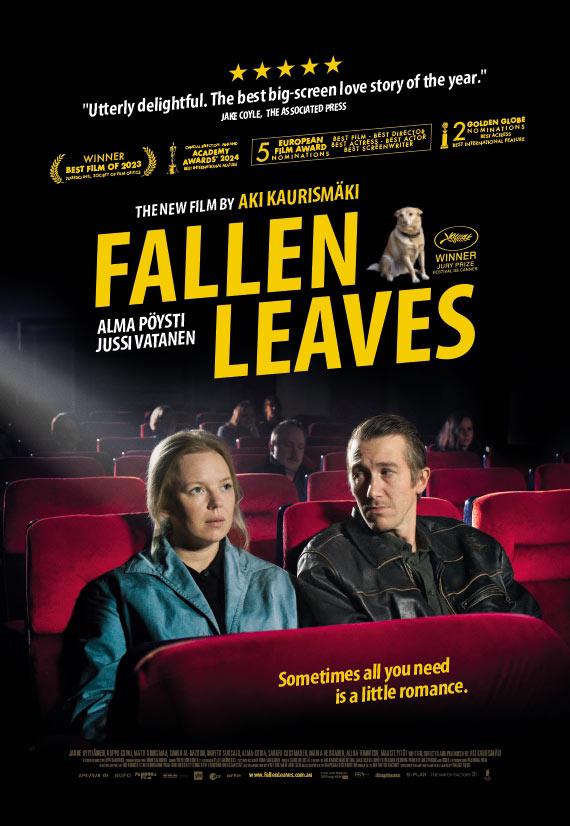Finland is a very dry country. Droll, if you will. This, at least, is the impression that writer-director Aki Kaurismäki (The Other Side of Hope) would like you to get from Fallen Leaves, the fourth film in his Proletariat trilogy. The last one was in 1990, and he claims to have retired in 2017, so you know he’s been cooking this up for a while. This is the sort of movie that you see if you enjoy two people coming together very slowly over a relatively short run time, filled with tiny delights and small victories.
Ansa (Alma Pöysti, Tove) is a supermarket worker reduced to eating expired food; Holappa (Jussi Vatanen) is an industrial site worker who drinks on the job. A couple of chance encounters between the two sparks a mutual interest between the two, but between Ansa not leaving her name and Holappa instantly losing her number, will chase ever allow them to meet again?
Fallen Leaves is a tight 81 minutes. It almost completely lacks event, and when something happens it’s so understated that you almost have to ask if it actually did. This is all part of the charm, as the dialogue is delivered in complete deadpan, declarative statements with almost no emotion backing them up.
Near equal time is given to Ansa and Holappa, but it’s easy to think that Pöysti is the star of the movie. She is a woman without much, but she knows exactly what she wants and how much she will tolerate. Her ambitions may be small, but you want a win for her; it’s hard not to respect a woman who knows her rights and won’t allow herself to be cowed by petty tyrants.
For Vatanen’s part, he gradually makes you care about Holappa’s quiet tragedy. What is initially played for laughs eventually becomes apparent as a legitimate problem. Most importantly, when all hope seems lost for the whatever number time, you still want things to work out for him, and you want Ansa to find him again if she can.
Fallen Leaves sounds like it should be depressing by any metric, but it is actually very gently funny. Holappa’s wingman Huotari (Janne Hyytiäinen, The Other Side of Hope) has an entire sideline at karaoke where he argues with Ansa’s wingwoman Liisa (Nuppu Koivu, The Other Side of Hope) about how his face lies about his age. Holappa is accused of being four minutes late for the third time in a week by his boss, and the only retort, handily ignored, is “it’s Monday”. The way that Ansa and Holappa dance around each other is so otherworldly that you have to wonder if they’re aliens, but of course it’s not that sort of movie. It is the sort of movie that features deadly earnest karaoke delivered in multiple languages, and a repertory theatre playing the most sincerely random films.
Kaurismäki litters the film with rituals and signifiers that mean everything and nothing, and highlights the drudgery of piecemeal work that his characters subsist on. It’s a world devoid of dignity, but Ansa, at least, won’t surrender her self-respect. Any despair that it makes you feel is counterbalanced by the thought that maybe some light will shine into our fated pair’s lives, and you have to have faith in Kaurismäki that it will. It’s not a vocally political movie, but it definitely is a statement piece.
It’s difficult to say if a Kaurismäki film would be thought of as odd in his native country or if that’s just what Finland is like. To an international viewer, it’s the eternal question. Fallen Leaves is a delightful oddball, an unorthodox love story between two nice people barely scraping by on the economical underbelly of their country. Its quiet, lackadaisical pace won’t appeal to everyone, but Kaurismäki has cultivated such a specific feel to this movie that is intoxicating if you get swept into it.


